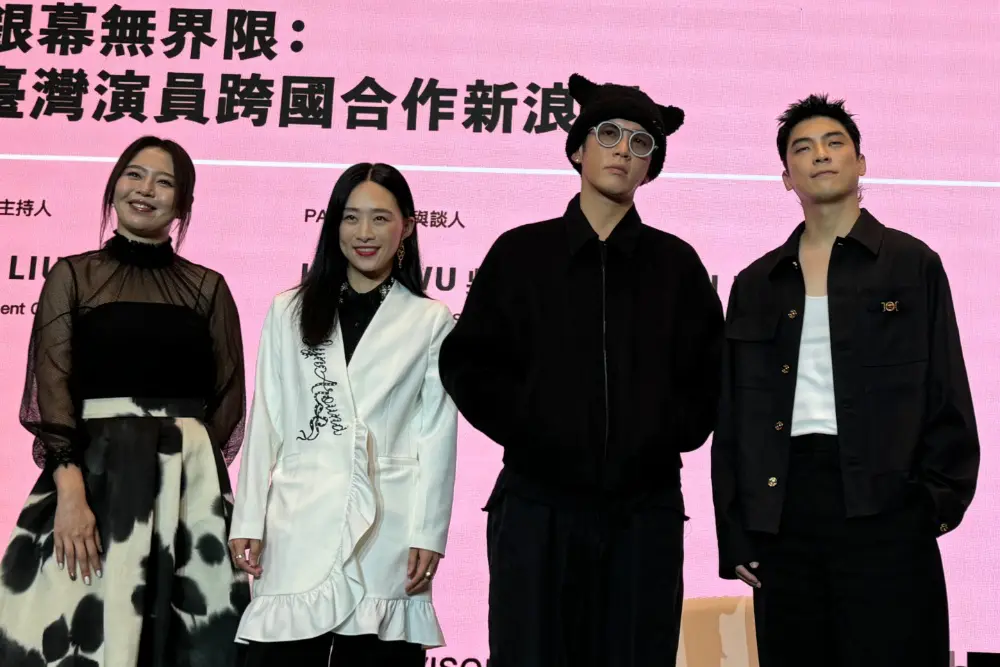Taiwan’s top actors navigate international film sets
A cultural exchange on global stages
At the recent Taiwan Creative Content Fest, some of Taiwan’s leading actors shed light on their intricate experiences with international co-productions. Among the speakers were industry faces like Wu Ke-Xi, J.C. Lin, Kai Ko, and Esther Liu. Their discussions spanned diverse topics, from language barriers to the nuanced approaches in filming intimate scenes across cultures.
The multilayered challenges of language and culture
Wu Ke-Xi shared a particularly compelling narrative about her work on the movie Black Tea. The film, directed by Abderrahmane Sissako, captured the essence of a French-language production immersed in the landscapes of Taiwan and Africa. The hurdles were manifold, starting with the rough script that encouraged actor improvisations, leading to constant translations between French and Chinese.
“The director’s vision was broad yet amorphous,” Wu recalled, “which made every day on set an unpredictably creative challenge.” This necessitated a unique linguistic expertise, compelling Wu to not only engage with French but also delve into Burmese and Thai for previous projects like Road to Mandalay. Her multilingual journey didn’t end there—she even studied local Portuguese for her role as a Chinese restaurant owner in Cape Verde, though those scenes never made the final cut.
Contract negotiations in the U.S. further illustrated the professional rigors Wu faced. Highlighting her methodical approach, she noted, “The agency arranged meetings with studio executives, ensuring every detail was professionally handled.” Notably, for her role in Blue Sun Palace, her contract included a clause to revoke intimate scenes until the day of release, underscoring the industry’s evolving approach to actor comfort and consent.
Communication styles: a cultural crossover
J.C. Lin, fresh from a Taiwan-French co-production, offered insights into the contrasting communication styles observed on international sets. “In Taiwanese culture, there’s an inherent deference—we listen before we speak,” Lin observed. This stood in stark contrast to the directness of his French co-star, a dynamic that reshaped the set’s environment.
Beyond communication, Lin’s experience on the Taiwan-India co-production Demon Hunters was revelatory. He learned the importance of respecting religious props and the sacred traditions they represent—an enlightening lesson in cultural sensitivity that transcended the boundaries of filmmaking.
Intimate scenes: a matter of cultural perspective
Kai Ko delved into the cultural disparities in filming intimate scenes, drawing from his experience as a BiFan jury member. He noted that what might be seen as rigid in one culture could be perceived as liberally spontaneous in another. “Foreign teams often have fewer restrictions. They chase spontaneity,” he commented. This was a stark contrast to his experience in Taiwan, where strict rules, like the prohibition against using one’s tongue during kissing scenes, are commonplace. “Imagine a kiss without tongues—it feels like two birds pecking,” Ko humorously added, highlighting the sometimes bewildering cultural scripts actors navigate.
Unexpected on-set experiences
Moderating the panel, Esther Liu, a notable Netflix actor, recounted an incident that epitomized the cultural surprises one might encounter. On a French production, a director unexpectedly placed a pillow between Liu and her co-star during an intimate scene, a move that was neither rehearsed nor communicated beforehand. “It caught us off guard, but it also taught us about the unpredictable nature of international filmmaking,” Liu reflected.
Balancing professionalism with cultural integrity
The panel discussion underscored how Taiwanese talent is increasingly sought after in the global film industry. Their ability to navigate complex cultural landscapes while maintaining professional standards and artistic integrity is central to their rising international influence.
From Wu’s multifaceted language skills to Lin’s adaptable communication methods and Ko’s candid reflections on intimate scenes, each actor showcased a unique facet of what it means to engage with global cinema today. Their stories are a testament to the resilience and versatility needed to thrive in an industry that is as culturally diverse as it is artistically demanding.
Sharing these experiences not only bridges the gap between different film cultures but also encourages a richer, more inclusive global cinematic dialogue. For more insights into the journey of these talented actors and the evolving landscape of international filmmaking, stay tuned to our updates and join the conversation on our social media channels.
Note: The article is structured with sections for easy navigation on digital platforms. Terms like language barriers, cultural disparities, and professional integrity are highlighted for SEO optimization. Movies mentioned are linked to their official trailers for additional context.

 Italian
Italian







